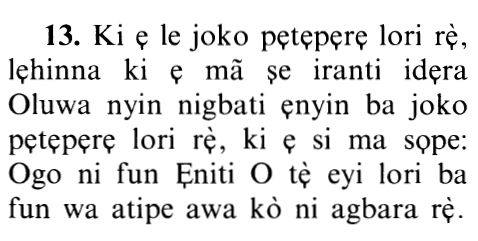43vs13
Select any filter and click on Go! to see results
لِتَسْتَوُوا عَلَى ظُهُورِهِ ثُمَّ تَذْكُرُوا نِعْمَةَ رَبِّكُمْ إِذَا اسْتَوَيْتُمْ عَلَيْهِ وَتَقُولُوا سُبْحانَ الَّذِي سَخَّرَ لَنَا هَذَا وَمَا كُنَّا لَهُ مُقْرِنِينَ
Litastawoo AAala thuhoorihi thumma tathkuroo niAAmata rabbikum itha istawaytum AAalayhi wataqooloo subhana allathee sakhkhara lana hatha wama kunna lahu muqrineena
Index Terms
Click to play
Yoruba Translation

Hausa Translation
Domin ku daidaitu a kan bãyansa, sa´an nan ku tuna ni´imar Ubangijinku a lõkacin da kuka daidaita a kansa kuma ku ce, "Tsarki ya tabbata ga Wanda Ya hõre mana wannan alhãli kuwa ba mu kasance mãsu iya rinjãya gare Shi ba.
Asbabu n-Nuzuul (Occasions of Revelation)
Allah says:
لِتَسْتَوُوا عَلَى ظُهُورِهِ ...
In order that you may mount on their backs,
meaning, sit comfortably and securely,
عَلَى ظُهُورِهِ (on their backs) means, on the backs of these kinds of animals.
... ثُمَّ تَذْكُرُوا نِعْمَةَ رَبِّكُمْ ...
and then may remember the favor of your Lord,
means, whereby these animals are subjugated to you.
... إِذَا اسْتَوَيْتُمْ عَلَيْهِ وَتَقُولُوا سُبْحانَ الَّذِي سَخَّرَ لَنَا هَذَا وَمَا كُنَّا لَهُ مُقْرِنِينَ ﴿١٣﴾
when you mount thereon, and say:
"Glory to Him Who has subjected this to us, and we could have never had it.''
means, if it were not for the fact that Allah has subjugated these things to us, we could never have done this by our own strength.'
Ibn Abbas, Qatadah, As-Suddi and Ibn Zayd said:
"We could not have done this ourselves.''
أي لتستووا متمكنين مرتفعين " على ظهوره " أي على ظهور هذا الجنس " ثم تذكروا نعمة ربكم " أي فيما سخر لكم " إذا استويتم عليه وتقولوا سبحان الذي سخر لنا هذا وما كنا له مقرنين " أي مقاومين ولولا تسخير الله لنا هذا ما قدرنا عليه قال ابن عباس رضي الله عنهما وقتادة والسدي وابن زيد : مقرنين أي مطيقين .
"لتستووا" لتستقروا "على ظهوره" ذكر الضمير وجمع الظهر نظرا للفظ ما ومعناها "ثم تذكروا نعمة ربكم إذا استويتم عليه وتقولوا سبحان الذي سخر لنا هذا وما كنا له مقرنين" مطيقين
يعني به الإبل خاصة بدليل ما ذكرنا . ولأن الفلك إنما تركب بطونها , ولكنه ذكرهما جميعا في أول الآية وعطف آخرها على أحدهما . ويحتمل أن يجعل ظاهرها باطنها ; لأن الماء غمره وستره وباطنها ظاهرا ; لأنه انكشف للظاهرين وظهر للمبصرين . " لتستووا على ظهوره " ذكر الكناية لأنه رده إلى ما في قوله : " ما تركبون " ; قاله أبو عبيد . وقال الفراء : أضاف الظهور إلى واحد لأن المراد به الجنس , فصار الواحد في معنى الجمع بمنزلة الجيش والجند ; فلذلك ذكر , وجمع الظهور , أي على ظهور هذا الجنس .
I'raab - grammatical analysis of the Qur'an
«لِتَسْتَوُوا» مضارع منصوب بأن مضمرة بعد لام التعليل وعلامة نصبه حذف النون والواو فاعله والمصدر المؤول في محل جر بحرف الجر وهما متعلقان بجعل «عَلى ظُهُورِهِ» متعلقان بتستووا «ثُمَّ» حرف عطف «تَذْكُرُوا» مضارع معطوف على ما قبله «نِعْمَةَ» مفعول به «رَبِّكُمْ» مضاف إليه «إِذَا» ظرفية شرطية غير جازمة «اسْتَوَيْتُمْ» ماض وفاعله والجملة في محل جر بالإضافة «عَلَيْهِ» متعلقان بالفعل «وَ تَقُولُوا» معطوف على ما قبله والواو فاعل «سُبْحانَ» مفعول مطلق لفعل محذوف «الَّذِي» مضاف إليه «سَخَّرَ» ماض فاعله مستتر والجملة صلة «لَنا» متعلقان بالفعل «هذا» مفعول به «وَ ما» الواو حالية وما نافية «كُنَّا» كان واسمها «لَهُ» متعلقان بمقرنين «مُقْرِنِينَ» خبر كنا وجملة ما كنا حالية
